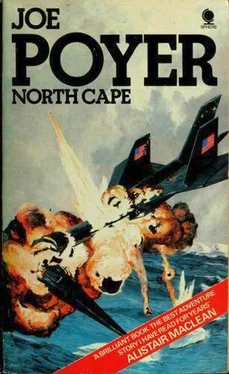Cadsen picked up a pack and crawled over to Teleman’s sleeping bag. “The clothes you arrived in are not the kind you want to wear when hiking in the Arctic, my boy.” He opened the pack and pulled out a pair of wide-mesh nylon underwear, lined ski pants, a loose nylon sweater, and a quilted dacron parka and hood and pushed them toward Teleman.
“Put these on. I think you’ll find them quite a bit warmer than a flight suit.”
“Yes, and hurry too. We were just about to wake you.” Teleman did as he was told, fumblingly at first as his tired brain sorted out fact from dream fiction. Some of the iron weariness had left him after his long sleep. But not enough, he thought. His body was still sluggish, although he knew he would lose some of that once out into the cold fresh air. But he knew damned well that he would never be able to walk twenty-five miles… why did they have to walk twenty-five miles anyway? He could not remember at first, then gradually, as the cobwebs cleared away, he remembered snatches of conversation they had had earlier. Teleman pulled the parka over his head, found his .22 revolver on top of his pack, and surreptitiously tucked it inside. Then, with the boots in his hand, crawled over to where the other three were clustered around a map.
“Our Red friends,” Folsom started without preamble as soon as Teleman joined the circle, “appear to want to welcome us to the land of the midnight sun.” In spite of the flippancy of his words, his voice was grim.
“We were informed about twelve hours ago that a suspected Russian submarine had landed a party of eighteen men about twenty-two miles southeast of here in Porsangerfjord. Then the sub withdrew’ a few miles and submerged. The landing party headed westward, apparently searching for you,” he said glancing up at Teleman. Teleman shook his head in confusion. “How the hell would they know where I was?” Folsom grinned wryly. “I suppose if we could track you down by radar they could too:’
“But that’s impossible. The ejection capsule carries its own ECM gear. They would never have been able to track me.”
“Could be,” Folsom admitted, “but somehow they are onto you. Maybe they just figured that you would have bailed out somewhere along the coast and as a last-ditch measure sent out the landing party in the hopes of picking you up.
“Be that as it may, they are out looking for you. Three hours ago Mac, here, got back from a little delaying action. He waylaid the party about twelve miles down the beach, shot them.up a little, then led them off into the forest. He estimates we gained about six hours while they sort themselves out of the trees enough to realize they have been tricked. When they figure that out, they will head west again, even faster.”
“Do you think they know exactly where we are?”
“I don’t think so. If they did, they would have come straight here. As it is, Mae says they have one group down on the beach and the other along the top of the cliffs.”
“Well if that’s it,” Teleman said with a deep sigh, “then there isn’t much to worry about. I landed about five miles into the trees. The capsule contains a self-destruct mechanism that literally reduces the thing to a lump of metal. If it’s still snowing, it ought to be pretty well covered up by now. How far back from the cliffs are we?”
“Wait a minute,” Folsom said quietly. “It’s not that simple. We are about a mile back from the beach. And we could move the tent farther south if I thought it would do any good. But our lifeboat is still on the beach. And the damned thing weighs about three tons. There is no way to move it, short of using explosives, which we haven’t got. So the Russians are going to find us if we stay around.”
“Now there is a problem there, isn’t there?” said McPherson, peering through the tent flap.-In spite of himself, Teleman shivered in the icy touch of the Arctic wind.
“It looks as though the wind will be kicking up the sea pretty badly by now. You can even hear the waves smacking into the cliffs. On top of which, the snow is so thick that you can’t see your hand in front of your face. -That rules out the helicopter on two counts…. So we walk.”
“Walk?” Teleman repeated weakly.
“Walk. All the way to the Norwegian naval base, or at least as far in that direction as we can to stay ahead of the Russians. We walk until the helicopter can get in to pick us up or we reach the base.”
Gadsen, who had been studying the map, looked up. “Commander, you’ve studied this place pretty thoroughly, just what kind of a base is it?”
“It’s now a combination radar and naval station. Pretty heavily defended and with some outmoded coastal artillery left by the Nazis, but supplemented with Hawk missiles. Our Ruski friends won’t risk outright aggression to get Teleman back — at least I hope they won’t — and if they do the Norwegians know how to use both the missiles and the artillery.”
“Well why in hell don’t we call them up and ask them to send some help. They must have Sno-cats or something like that.” Folsom looked pained for a moment. “Come on, you know the answer to that as well as I do. The old man says no. And that is that.” Teleman glanced away, slightly ashamed. He knew why the “old man” said no. And he knew that Folsom was practicing a slight deception. The old man was not the commanding officer of the RFK, but his own boss sitting warm and comfortable somewhere in the Virginia foothills. They could not ask, except as a last resort, for help from the Norwegians because he was not supposed to be in Norway. The United States had no authorization from the Norwegian Government for overflights. And the only way to avoid embarrassing questions and strained relations was not to let the Norwegians know that he was in Norway. So they would have to start walking toward the base in the hope that something would happen — either the weather would moderate or else they would be able to get some other kind of aircraft in to pick up the party. If all else failed, they would have to walk in on the Norwegians. The problem at the moment was to stay far enough ahead of the Russians to keep from being captured. Teleman’s head ached with the intensity of tightening thumb screws. In addition to being weary beyond reason, his vision was hazy and full of wild afterimages resulting from the microtraces of lysergic acid remaining in his system. As he sat across from the executive officer he was positive that ample precautions had been taken to ensure that he would not be captured by the Russians. But which of the three sailors had orders to kill him if capture appeared imminent?
Was it Folsom? he wondered. Folsom knew too many details, knew the vital importance of his missions — details that could not be gained by conjecture alone. If not Folsom, which of the other two? McPherson, if what Folsom had told him was true, had hiked eleven miles one way to waylay the Russians. A former member of the SEALS, he would know all about assassination. But, on the other hand, he knew nothing about the other—
What was his name? — Gadsen. Maybe the question, he had raised about the Norwegians sending help was only a blind to allay any suspicion that he, Teleman, might have. God, maybe they were all three in on it. They could be waiting to see how things would work out before they moved. He would just have to waif and see, he decided. But Teleman knew one thing: nobody was going to put a bullet in his back, not after all that he had been through. If he was going to die, then it was going to be from a Russian bullet.
Teleman unconsciously sank back a little farther against the gear. His face took on for the briefest of moments the haunted look of a hunted animal. His eyes were narrow and glittering in the. uncertain light and the skin of his face drew into a drum tightness. If one of the three sailors had been watching, what he would have seen in Teleman’s face might have prevented a portion of tragedy.
Читать дальше












